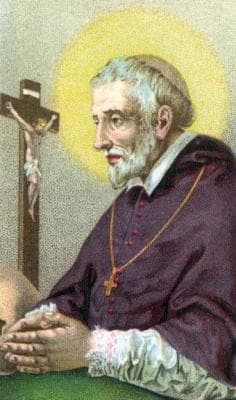
Blessed Giovanni Giovenale Ancina
Blessed
Feast Day: August 30
Birth: October 19, 1545
Biography
Blessed Giovanni Giovenale Ancina, also known as Giovenale Ancina or Juvenal Ancina, was born on October 19, 1545, in Fossano, Piedmont, Italy. He hailed from a wealthy and politically connected family and received an excellent education in medicine and philosophy.
Ancina was a man of many talents and had a remarkable gift for academia, music, composition, music editing, and public speaking. His scholarly pursuits led him to become a renowned professor of medicine at the University of Turin in Italy. His expertise in medicine also caught the attention of the ambassador from Savoy to Rome in 1575, who appointed Ancina as his private physician.
During his time in Rome, Ancina had a fateful encounter with Saint Philip Neri, a prominent figure of the Counter-Reformation movement. Inspired by Neri's devotion and holy example, Ancina felt a profound calling to the priesthood and decided to dedicate his life to the service of God.
In response to his calling, Ancina joined Saint Philip at the Congregation of the Oratory in Naples, Italy. The Congregation, founded by Neri, emphasized the importance of prayer, preaching, and charitable works. Ancina actively participated in the community's spiritual exercises and contributed his musical talents to enhance the liturgical celebrations.
One of Ancina's notable achievements was the introduction of written catechisms in Saluzzo, Italy. Recognizing the need for a structured and accessible form of religious instruction, Ancina introduced catechisms as a means to educate and guide the faithful. As a result, Saluzzo experienced a revitalization of faith and greater emphasis on good works.
In recognition of his exemplary dedication, Ancina was appointed as the Bishop of Saluzzo in 1596. He embraced his episcopal responsibilities wholeheartedly, promoting spiritual growth, fostering religious education, and working tirelessly for the welfare of his diocese.
However, tragedy struck when it was alleged that Ancina was poisoned by a monk whom he had chastised. These unfortunate circumstances cut short the life of Ancina, making it difficult to provide further details about his death and veneration.
Despite the lack of specific information regarding the exact date of his death and the formal recognition of his holiness, Blessed Giovanni Giovenale Ancina continues to be venerated by those who appreciate his immense contributions to the Catholic Church's intellectual and spiritual life. His life stands as a testimony to the transformative power of faith and the profound impact a single individual can have in uplifting the hearts and minds of others.